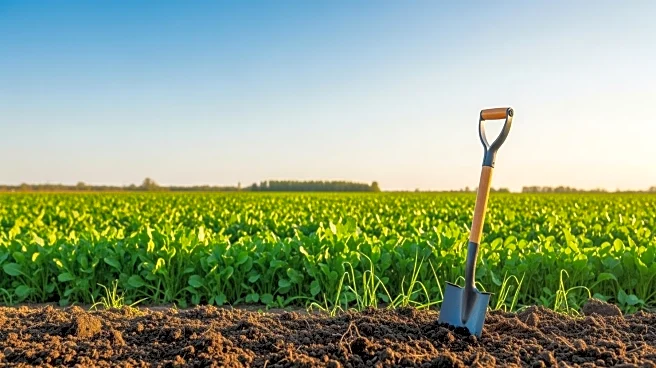What's Happening?
The UK is experiencing a significant rise in food prices, a phenomenon termed 'drought-flation,' due to failed harvests caused by extreme weather conditions such as droughts and floods. The Bank of England
has warned that food inflation could increase by 5.5% by the end of the year, impacting families across the country. The degradation of soil, which is losing its ability to absorb water and store carbon, is a major factor contributing to these agricultural challenges. Approximately 40% of Britain's agricultural land is already degraded, exacerbating the effects of extreme weather on crop yields. The Agricultural and Horticultural Development Board (AHDB) reported that wheat yields are below the ten-year average, and winter barley has also underperformed. The UK government is being urged to invest in soil regeneration to protect farmers, consumers, and supermarkets from the adverse effects of these environmental changes.
Why It's Important?
The rising food prices and failed harvests have significant implications for the UK economy and food security. As Britain imports 40% of its food, disruptions in global agriculture directly affect local prices, leading to increased costs for everyday goods like olive oil and coffee. The degradation of soil not only impacts crop yields but also affects the quality of produce, with some crops being downgraded and redirected to lower-grade markets. Investing in soil regeneration is crucial to enhance the resilience of British agriculture, ensuring sustainable food production and mitigating the impact of extreme weather conditions. This investment is vital for maintaining food security and stabilizing the economy, as well as supporting the livelihoods of farmers and the affordability of food for consumers.
What's Next?
The UK government may consider implementing policies and funding initiatives aimed at soil regeneration to address the challenges posed by 'drought-flation.' This could involve promoting regenerative agricultural practices that enhance soil health and resilience. Stakeholders, including farmers, environmental groups, and policymakers, are likely to engage in discussions to develop strategies for sustainable agriculture. The focus will be on improving soil's ability to retain water and nutrients, thereby increasing crop yields and quality. Additionally, there may be increased collaboration with international partners to address global agricultural disruptions and their impact on the UK food supply chain.
Beyond the Headlines
The issue of soil degradation highlights broader environmental and sustainability challenges facing agriculture globally. The reliance on monocultures and chemical-heavy farming practices has long-term implications for soil health and biodiversity. Transitioning to regenerative agriculture not only addresses immediate food security concerns but also contributes to climate change mitigation by enhancing carbon storage in soils. This shift requires a cultural and policy change towards valuing long-term resilience over short-term efficiency in agricultural practices.











